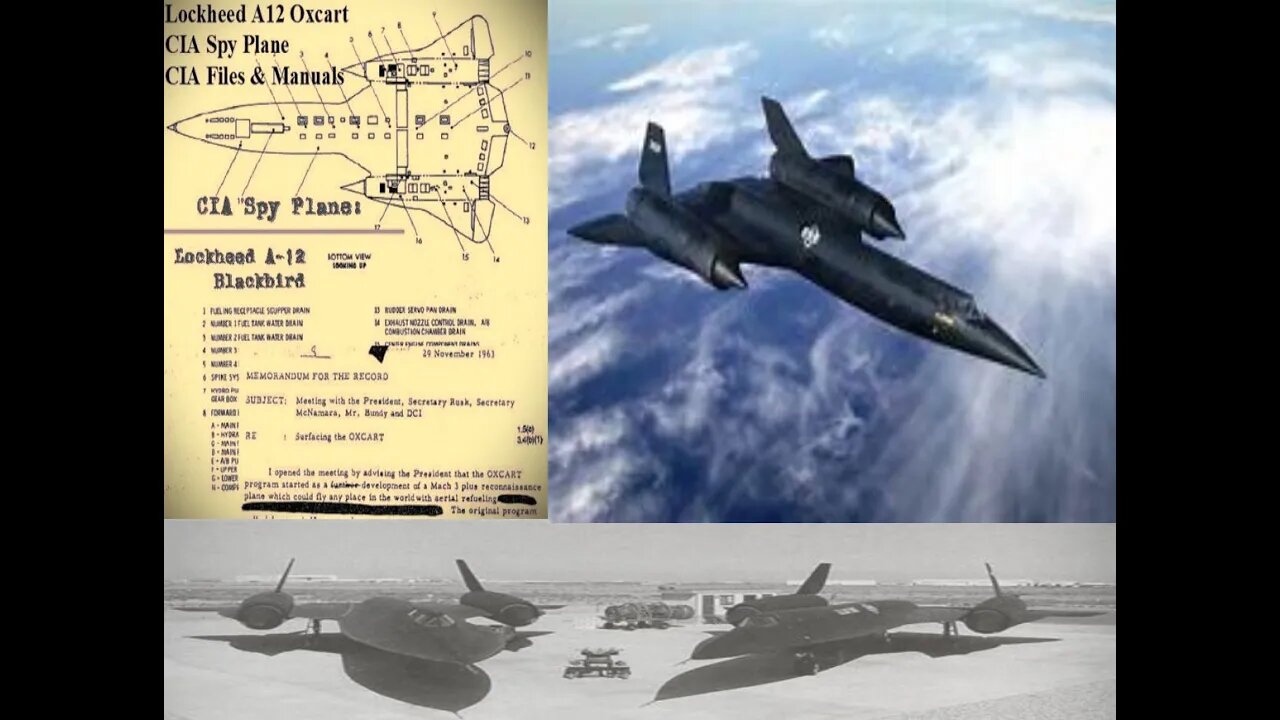Premium Only Content

CIA developed the highly secret A-12 OXCART- High-Flying Reconnaissance
About the A-12 OXCART
CIA developed the highly secret A-12 OXCART as the U-2 spy plane’s successor, intended to meet the nation’s need for a very fast, very high-flying reconnaissance aircraft that could avoid Soviet air defenses. CIA awarded the OXCART contract to Lockheed (builder of the U-2) in 1959. In meeting the A-12’s extreme speed and altitude requirements, Lockheed–led by legendary engineer Clarence “Kelly” Johnson–overcame numerous technical challenges with cutting-edge innovations in titanium fabrication, lubricants, jet engines, fuel, navigation, flight control, electronic countermeasures, radar stealthiness, and pilot life-support systems. In 1965, after hundreds of hours flown at high personal risk by the elite team of CIA and Lockheed test pilots, the A-12 was declared fully operational, attaining the design specifications of a sustained speed of Mach 3.2 at 90,000 feet altitude.
CIA’s operational use of the A-12 was beset by not only many technical problems but also political sensitivity to aircraft flights over denied areas and competition from imaging satellites. After the U-2 piloted by Francis Gary Powers was shot down over the Soviet Union in May 1960, all USSR overflights were halted, thus blocking the A-12’s original mission to monitor the Soviet Bloc. By the time of CIA’s first A-12 deployment in 1967, CORONA satellites were being launched regularly to collect thousands of images worldwide each year. Although its imagery was less timely and of poorer resolution than the A-12’s, CORONA was invulnerable to anti-aircraft missiles and much less provocative than A-12 overflights. At the same time, the US Air Force was developing the SR-71, a modified version of the A-12. Seeing little value in maintaining both overt SR-71 and covert A-12 fleets with similar capabilities, President Johnson ordered retirement of the A-12 in 1968.
The only A-12 reconnaissance operation, codenamed BLACK SHIELD, took place from May 1967 to May 1968. A detachment of six pilots and three A-12s based at Kadena Air Base in Okinawa flew 29 missions over East Asia. The panoramic stereo camera aboard each aircraft yielded considerable high-quality imagery that within hours of landing was processed and under the eyes of photointerpreters, who extracted key intelligence information in support of US military operations during the Vietnam War.
CIA’s A-12 represents a pioneering achievement in aeronautical engineering and, to this day, holds records for speed and altitude (Mach 3.29 at 90,000 feet) for an air-breathing piloted jet aircraft.
In 2007 the US Air Force transferred an A-12 to CIA for display. CIA Museum’s A-12 is the eighth of 15 built under the OXCART Program and one of nine remaining. It is known as Article 128, with a serial number of 60-6931. Its first flight was on 3 October 1963, and it was the first of the operational fleet to be certified to fly at Mach 3. During its lifetime, it logged 453 hours on 232 test and training flights. The airframe was retired on 28 May 1968.
-
 LIVE
LIVE
IsaacButterfield
5 hours ago $0.15 earnedFree Speech Is Dead | Did Trump Go Too Far? | Sexist Job
114 watching -
 1:02:59
1:02:59
Sarah Westall
7 hours agoEpstein Files, Dueling Cabal Factions and Gold from Ancient Civilizations w/ Dave Hodges
24.7K7 -
 41:25
41:25
CatfishedOnline
6 hours ago23-Yr-Old Drove 2,650 Miles to Meet Online Girlfriend in Romance Scam
9.77K -
 LIVE
LIVE
Bare Knuckle Fighting Championship
2 days agoCountdown to BKFC FIGHT NIGHT ALBUQUERQUE & FREE LIVE FIGHTS!
258 watching -
 1:46:26
1:46:26
Vigilant News Network
7 hours agoDiddy’s Epstein Moment: Is the Fix Already In? | The Daily Dose
72.9K6 -
 1:57:50
1:57:50
Revenge of the Cis
6 hours agoEpisode 1454: Do You Feel In Charge
45.5K19 -
 1:05:17
1:05:17
In The Litter Box w/ Jewels & Catturd
1 day agoEPSTEIN: PHASE ONE | In the Litter Box w/ Jewels & Catturd – Ep. 752 – 2/28/2025
104K54 -
 1:49:10
1:49:10
The Quartering
7 hours agoTrump DESTROYS Zelensky To His Face, Trump Assassin Accomplice & Epstein File Debacle
143K93 -
 55:32
55:32
LFA TV
1 day agoGermany’s Conquest of Europe | TRUMPET DAILY 2.28.25 7PM
16.7K3 -
 1:33:58
1:33:58
2 MIKES LIVE
4 hours ago2 MIKES LIVE #186 Oval Office Fireworks!
10.5K